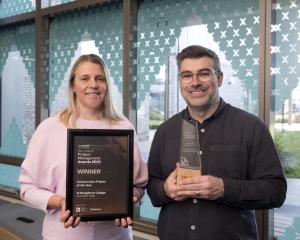The Otago Regional Council is on the brink of restricting irrigators, with officials saying little significant rain is likely in coming weeks and river levels are low.
Dry conditions affecting Otago were forecast to continue for at least the next seven days, MetService meteorologist Peter Little said.
A large high pressure area was due to hang around into the weekend, bringing temperatures of 30degC to Central Otago and mid-20degC on the coast.
"Later in the weekend, we may see a weak front but it's not expected to bring a significant amount of rain, just drizzle.''
The region has had little rainfall in the past four weeks, except on New Year's Eve when a front dropped 21.4mm on Dunedin and 20.8mm in Queenstown.
The dry weather was also increasing the fire risk, which was high to extreme across much of the region.
Otago Regional Council chief executive Peter Bodeker yesterday warned if river flows continued to drop, the council might, for the first time, issue water shortage directions.
The move would reduce or stop water use for those with unrestricted mining privilege rights to water as well as those on resource consents.
"In '99 and '84, we got close [to issuing water shortage directions]. This is on par with those two years. There is no doubt this is severe.''
The dry weather had already put several Otago river catchments, including the Taieri and Shag Rivers, at, or below, their minimum flow levels, which meant irrigation must stop or be substantially reduced.
On the Taieri River, farmers would be most affected if water shortage directions were imposed because it was dominated by mining privilege takes which were not subject to minimum flow restrictions.
"Those irrigators taking water under deemed permits should manage their water carefully and responsibly, being mindful of community needs and the vulnerable river ecology, given the extent of the low flows,'' Mr Bodeker said.
Significant rainfall was needed to increase flows, he said.
The persistent dry weather conditions in Central and North Otago meant irrigators needed to carefully manage what water was still available.
Meetings would be held between Central Otago irrigation companies and the regional council tomorrow.
"We hope they'll be able to manage this themselves and not need a water direction.''
Council staff would closely monitor irrigation in all those catchments and any illegal irrigation found could result in enforcement action, he said.
Raineffects hydrologist Dave Stewart, of Dunedin, said after a ''horrendous'' November and early December, the weather pattern changed, becoming dominated by anticyclones which meant little substantial rain was likely.
The average period for such weather patterns to stay around was six weeks and it had been in play for four weeks, Mr Stewart said.
However, the ''cold one stayed around for eight to nine weeks so we might not see much [rain] for another month''.
The only part of the region ''looking good'' was the Southern Lakes, with the rest of the region struggling and needing rain soon, he said.
''Farmers have had it good for six or seven seasons and this is the time it is supposed to get hot and dry, especially in Central Otago,'' Mr Stewart said.
Federated Farmers Otago chairman Stephen Korteweg said farmers, especially those in South Otago, had been enjoying the warm weather after a wet spring and early summer.
''Up to a few days ago, we were still enjoying the honeymoon but it is starting to bite a wee bit in areas prone to drying out, particularly in Central Otago and North Otago where they rely on irrigation.''
The prospect of further water restrictions would be a ''double whammy'' for those farmers, he said.
''But we're not pushing the panic button yet.''
Dunedin City Council water production manager Gerard McCombie said all of the city's water systems, including Port Chalmers and Mosgiel, were under pressure and people needed to be careful about their water use, especially on hot days.
Waikouaiti residents had responded by dropping their demand, easing the pressure on that system, which was appreciated, he said.
In Dunedin, there was a ''modest surplus'' of supply against demand and the city had not had to pump from the Taieri River yet.
''We're in the hands of the weather gods and people's water use habits.''











